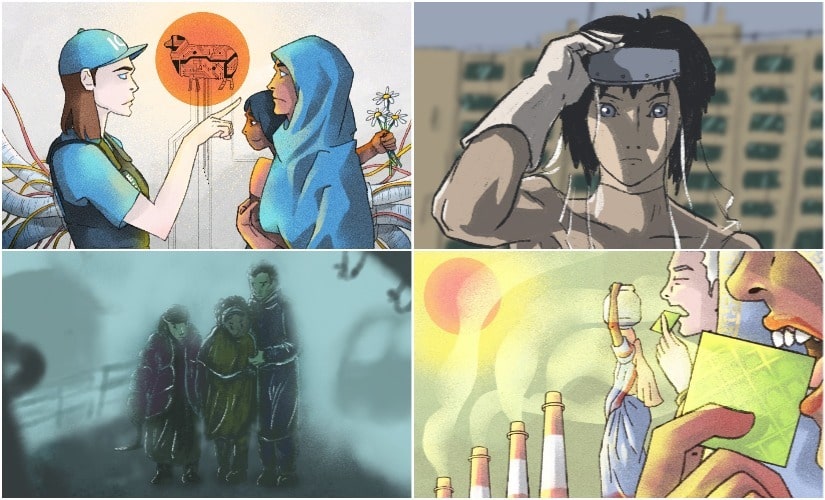When science fiction writers of years past gazed into their crystal balls, they imagined technological breakthroughs and their potential ramifications. Many predicted bleak futures resembling dystopias. But despite their dim view of humanity, none imagined it would be on-trend in the 21st century to wonder: Whose dystopia are we living in? None imagined a world where protesters would carry signs with slogans like, “Make Margaret Atwood fiction again.” They thought they were playing a game of probabilities, not prophecies. But just as yesterday’s dreams became today’s technologies, yesterday’s fiction also became today’s reality. Of course, some sci-fi writers have a better track record with technological predictions than others. In Ralph 124C 41+, Hugo Gernsback described radar and Skype long before they became a reality. Isaac Asimov foresaw flat-screen TVs, 3D movies and Skype. Arthur C Clarke imagined everything from self-driving cars (Imperial Earth) and virtual reality games (The City and the Stars) to iPads and AIs (2001: A Space Odyssey). [caption id=“attachment_7845911” align=“alignnone” width=“825”]  Clockwise from top left: Do Androids Dream of Electric Sheep?; Ghost in the Shell; Soylent Green; Children of Men. Illustrations by Trisha Bose, Sharath Ravishankar for Firstpost[/caption] Some predictions were approximations, if not accurate. Jules Verne predicted manned spaceflight to the moon (in From the Earth to the Moon) but he pictured passengers being fired into the lunar surface with an enormous cannon. It is, however, unlikely we’ll ever see Back to the Future’s flying cars or Star Trek’s teleporters and warp drive systems. But these aren’t necessarily failures of vision. Some of the creative minds working on this sci-fi fare used technology primarily as a sandbox to build futuristic settings in accordance with their high-concept premises. Their priorities were different: to see how human beings respond to crisis, and who we are, or could be, during such times. So, they weren’t too worried about their vision falling short of future realities. After all, science fiction is less about factual predictions of imagined technologies, and more about society as it exists today. It is an examination of possible futures based on past patterns. Its thought experiments are thus a tool of deterrence against catastrophes we wish to avoid. Ultimately, we determine which technologies we invent and come to rely on. But we haven’t been heeding the cautionary lessons presented in the various dystopian visions. If HG Wells successfully predicted the future of warfare, involving tanks (The Land of the Ironclads) and atomic bombs (The World Set Free), Robert Heinlein built on it (in Solution Unsatisfactory), predicting a nuclear arms race sparked off by the US. But we didn’t listen, even as the world came close to a nuclear catastrophe and we were dancing on the brink of human extinction. Though 1984 was written under the looming threat of the Soviet Union, it feels every bit as prescient today as it was then. George Orwell warned us about being manipulated through propaganda, and fact and language distortion. He showed us a world where surveillance could become an inescapable part of daily life. But we didn’t listen. Instead, we sit and watch Big Brother rather than face our geopolitical realities. In Brave New World, Aldous Huxley foresaw a vapid consumerist society and a standardised lifestyle culture, which somehow convinces itself that inequality is crucial for “community, identity, stability”. But we didn’t listen. Instead, we take our Prozacs, Juuls or whatever is our “Soma” of choice to cope with our 9-5 gigs serving our corporate overlords. Just as science is always catching up to science fiction, reality is now catching up to dystopia. As we enter a new decade, we’re at a stage where we must examine how visions of the 2020s — imagined in books like Do Androids Dream of Electric Sheep?, films like Soylent Green, or even manga like Ghost in the Shell — could match up against our own reality. Science fiction remains our only reference for how the future might look, sound, smell, taste and feel. If we heed the consequences envisioned by our greatest minds, we may be bound for futures more favourable to human progress. But we must be aware of the role technology plays in this progress without it becoming detrimental to us as individuals, as society, and as Earth-dwellers. As Arthur C Clarke once said: “A critical reading of science fiction is essential training for anyone wishing to look more than 10 years ahead.” Read on… 1. AI, free will and slavery, in _Do Androids Dream of Electric Sheep?_ (1968) 2. A food crisis wrought by overpopulation and climate change, in _Soylent Green_ (1973) 3. Sex, love and alienation in the digital age, as seen in 2014’s _Her_ 4. Class structures and dehumanisation of the workforce, as foretold by _Metropolis_ (1927) 5. Marginalising of refugees, as seen in 2006’s _Children of Men_ 6. The transhumanism of _Ghost in the Shell_ **(1989) and** _Deus Ex: Human Revolution_ **(2011)** Words by Prahlad Srihari | Art by Trisha Bose and Sharath Ravishankar | Concept by Rohini Nair and Harsh Pareek **_Read our 'Decade in Review' series here._**
As we embark on a new decade, how do visions of the 2020s — imagined in books like Do Androids Dream of Electric Sheep?, films like Soylent Green, or even manga like Ghost in the Shell — match up against our reality? In this special series, we look at six pop culture artefacts from the past that foretold the future, providing a prophetic glimpse of the decade we’re now entering | #SciFiSeers
Advertisement
End of Article


)
)
)
)
)
)
)
)
)



